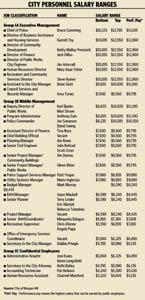The city refuses to make public the exact salaries of its
executive team and its assistants even as the state’s top court
leans toward ruling in favor of open public pay records, according
to media outlets closely watching the case.
Morgan Hill – The city refuses to make public the exact salaries of its executive team and its assistants even as the state’s top court leans toward ruling in favor of open public pay records, according to media outlets closely watching the case.
The Morgan Hill Times submitted a California Public Records Act request on May 23 and 29 for names, titles and salaries for about 35 of Morgan Hill’s top managers and their assistants. On June 15, the city released names, titles and salary ranges, arguing that privacy trumped the public’s right to know the exact earnings.
“This is just a power play by the city, or they’ve got something to hide,” said Mainstreet Media Group President and CEO Anthony Allegretti, adding the company would file a lawsuit if necessary to force the city to release the information. “It’s absolutely clear under California law that public employee salaries are public record. In my opinion, the city attorney obviously doesn’t have much experience in this area of law.”
Added Morgan Hill Times Editor Sheila Sanchez, “It’s an insult to Morgan Hill residents to withold this information. We will fight tooth and nail to secure the salary data for the sake of our readers who have a right to see how their tax dollars are spent.”
Morgan Hill City Attorney Janet Kern wrote in an e-mail the public can easily determine how much the city is spending on employee salaries as a whole and by department by looking at the city’s adopted budget. But she said providing exact wages for employees would violate their privacy rights.
“Each individual’s exact salary … is a function of their past work experience and education, their years of service with the city and their individual performance evaluations,” Kern said. “To date the courts have held that type of personal information is protected from public scrutiny.”
But that could soon change. The California Supreme Court is weighing privacy rights against local governments’ obligation to make public the names and salaries of their employees. The case stems from a 2003 lawsuit filed by the Contra Costa Times against the city of Oakland for refusing to release the names and salaries of every employee earning more than $100,000 a year. An Alameda County judge and a state appellate court sided with the newspaper. A final ruling is expected by the end of August.
“Historically this information has been widely accessible,” said Tom Newton, general counsel for the California Newspaper Publishers Association, who is following the case and who filed a friend of the court brief to the state Supreme Court on behalf of the CNPA. “In the balance of the public’s right to know and the employees’ right to privacy, the public has an overriding interest in understanding precisely what it is paying its public employees.”
South Valley Newspapers Executive Editor Mark Derry said the issue goes to the core of a responsible democracy.
“You can’t have responsible citizens if you don’t have responsible government,” Derry said. “To have good government you have to know exactly what public employees are earning. It’s a fundamental part of our democracy.”
Added Times Editorial Board member Lisa Pampuch in an e-mail: “This is an important part of voters’ ultimate responsibility of holding elected officials accountable. For example, when salary ranges only are released, taxpayers don’t know how many employees in a particular agency are paid at the top of the ranges, how many in the middle, how many at the bottom. Salary distribution ought to roughly follow a bell curve, with most employees earning in the middle of the ranges, a few at the low end and a few at the high end. Taxpayers deserve to know if that’s the case in the many governmental agencies they support, and if that’s not the case, why, so that they can hold elected officials accountable.”
Because there is no written Morgan Hill City Council policy on the release of salary information, Kern based her position on case law. In 2003, a San Mateo County judge issued a temporary injunction against the release of names with salaries in a case involving Atherton, Burlingame, Belmont, Foster City and San Carlos. The council did not challenge Kern’s position when she notified them of the Times’ Public Records Act request.
“We have to balance protecting the employees privacy with what we can disclose,” said Morgan Hill Mayor Steve Tate. “If the court decides we need to release more information, we’ll do that as soon as possible.”
A lawyer for Oakland public employees argues the release of names and salaries will expose workers to identity thieves, data brokers, spammers and others who will abuse the information.
But media attorney Newton said there’s no evidence to support that claim.
“This information has been made public in the past with no record of abuse,” he said. “When the judge asked for examples, the unions couldn’t pinpoint a single incident.”








